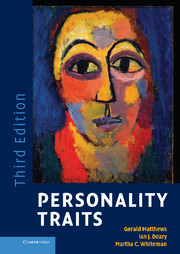Book contents
- Frontmatter
- Contents
- List of figures
- List of tables
- List of boxes
- Preface to the third edition
- Preface to the second edition
- Preface to the first edition
- Part I The nature of personality traits
- Part II Causes of personality traits
- 6 Genes, environments and personality traits
- 7 The psychobiology of traits
- 8 The social psychology of traits
- Part III Consequences and applications
- 14 Conclusions
- References
- Author index
- Subject index
- References
8 - The social psychology of traits
Published online by Cambridge University Press: 05 June 2012
- Frontmatter
- Contents
- List of figures
- List of tables
- List of boxes
- Preface to the third edition
- Preface to the second edition
- Preface to the first edition
- Part I The nature of personality traits
- Part II Causes of personality traits
- 6 Genes, environments and personality traits
- 7 The psychobiology of traits
- 8 The social psychology of traits
- Part III Consequences and applications
- 14 Conclusions
- References
- Author index
- Subject index
- References
Summary
Introduction: personality and social behaviour
Social-psychological approaches have played a major role in personality psychology. In the modern era, the two most influential theorists are Albert Bandura (e.g., 1997) and Walter Mischel (e.g., 1999). Bandura's studies of modelling (e.g., Bandura and Walter, 1963) showed how social learning processes could generate dispositions, such as tendencies towards aggression. However, such dispositions were seen as dynamic rather than static, in that they undergo ongoing modification as a consequence of interaction with the environment. Mischel also emphasised social learning and dynamic person–environment interaction. His personality theory is also known for its emphasis on the situation: individuals may display consistent behaviours in specific situations, consistencies that are not related to conventional traits. The relationship between these approaches and trait theory has often been thorny: as discussed in chapter 2, Mischel's (1968) critique of trait theory was seen, in his words (Mischel, 1999, p. 39), ‘as a glove hurled to the ground’. As Mischel (1999) also points out, the two disciplines of personality psychology had previously been unified in constructive collaboration. At the present time, there is increased interest in whether – and if so, how – a new unity between the two disciplines may be forged.
From the trait perspective, there is renewed interest in social learning approaches because of evidence that links traits to the explanatory constructs of social learning theorists.
- Type
- Chapter
- Information
- Personality Traits , pp. 231 - 266Publisher: Cambridge University PressPrint publication year: 2009

